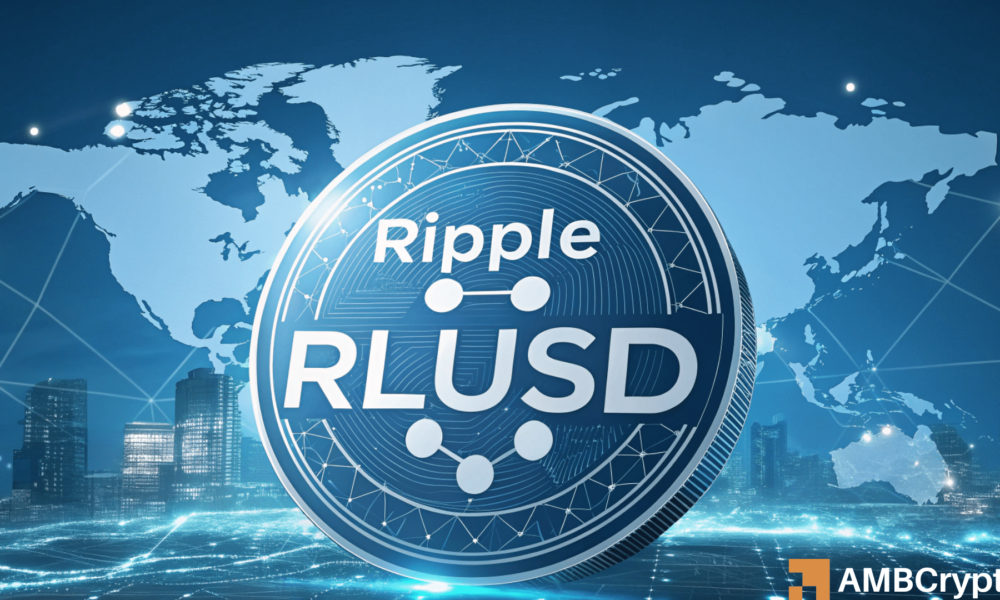Ripple[XRP] Labs has been making significant strides in the digital finance sector with the integration of its RLUSD stablecoin into Ripple Payments. This move, confirmed by Jack McDonald, CEO of Standard Custody, signifies a major step towards global enterprise payment dominance. The integration of RLUSD into Ripple Payments opens up a vast network of banks, financial institutions, and payment providers worldwide, providing businesses with direct access to deep liquidity for efficient cross-border transactions.
Since its official launch in December 2024, RLUSD has experienced impressive growth, with Ripple recently minting 50 million new RLUSD tokens on the XRP Ledger. This surge in demand has propelled the token’s total market capitalization to $293.79 million, exceeding initial projections. Additionally, listings on major exchanges like Kraken and Margex have further boosted RLUSD’s exposure, indicating growing confidence among institutions. While RLUSD may still lag behind industry giants like USDT and USDC, its trajectory suggests that it could soon close the gap and establish itself as a top contender in the stablecoin arena.
Unlike its competitors, RLUSD aims not just to compete but to disrupt the stablecoin market by focusing on regulatory compliance and enterprise-grade infrastructure. Ripple’s goal is to position RLUSD among the top five stablecoins globally by late 2025, with a target market cap of $3 billion. This strategic approach sets RLUSD apart and gives it a competitive edge in the rapidly evolving digital asset landscape.
In response to Ripple’s expansion strategy, XRP remains a key player in the narrative. Recent reports confirm that Ripple has re-locked 700 million XRP in escrow, signaling long-term confidence and reducing immediate market supply. Despite a 2.49% drop in price over the last 24 hours, XRP’s trading volume has surged by 63.28%, reaching $6.82 billion. Technical analysis shows that XRP is trading within a bullish pennant flag, with potential for upward momentum towards key resistance levels.
Overall, the integration of RLUSD and Ripple’s expansion strategy position both RLUSD and XRP for sustained growth and success in the digital finance ecosystem. With a focus on utility, compliance, and adoption, Ripple is paving the way for greater innovation and disruption in the global payment landscape. The Benefits of Adopting a Plant-Based Diet
In recent years, there has been a growing trend towards adopting plant-based diets for various reasons, including health, environmental, and ethical concerns. A plant-based diet is one that focuses on consuming whole, minimally processed plant foods such as fruits, vegetables, whole grains, legumes, nuts, and seeds, while minimizing or eliminating animal products like meat, dairy, and eggs. Here are some of the key benefits of adopting a plant-based diet:
1. Improved Health: Numerous studies have shown that plant-based diets are associated with a lower risk of chronic diseases such as heart disease, diabetes, and certain types of cancer. Plant foods are rich in essential nutrients like fiber, vitamins, minerals, and antioxidants, which can help support overall health and reduce inflammation in the body. Additionally, plant-based diets are typically lower in saturated fat and cholesterol, which can help lower blood pressure and improve cholesterol levels.
2. Weight Management: Plant-based diets are often lower in calories and higher in fiber compared to diets that include animal products. This can help with weight management and weight loss goals, as fiber helps to keep you feeling full and satisfied, reducing the likelihood of overeating. Many plant-based foods are also naturally low in fat, making them a great choice for those looking to maintain a healthy weight.
3. Environmental Sustainability: The production of animal products like meat and dairy is a major contributor to greenhouse gas emissions, deforestation, and water pollution. By choosing plant-based foods, you can help reduce your environmental impact and promote sustainability. Plant foods typically require fewer resources like water and land to produce, making them a more eco-friendly choice for those looking to reduce their carbon footprint.
4. Ethical Considerations: Many people choose to adopt a plant-based diet for ethical reasons, as the production of animal products often involves the mistreatment and exploitation of animals. By choosing plant-based foods, you can support more humane and sustainable farming practices that prioritize the well-being of animals and the environment.
5. Lower Risk of Foodborne Illness: Plant-based diets are less likely to be contaminated with harmful bacteria like E. coli and Salmonella, which are commonly found in animal products. By choosing plant-based foods, you can reduce your risk of foodborne illnesses and promote food safety in your diet.
Overall, adopting a plant-based diet can have numerous benefits for your health, the environment, and animal welfare. Whether you choose to go fully plant-based or simply incorporate more plant foods into your diet, making the switch can have a positive impact on your well-being and the world around you. So why not give it a try and see how a plant-based diet can benefit you?

